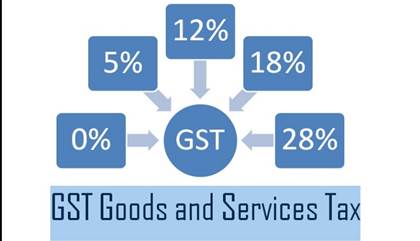Description

Disclaimer: Copyright infringement not intended.
Context
- A ministerial panel is likely to recommend a uniform 28 percent tax rate, irrespective of whether it is a game of skill or chance.
GST
- GST is an Indirect tax which introduced to replacing a host of other Indirect taxes such as value added tax, service tax, purchase tax, excise duty, and so on.
- Goods and Services Tax Law in India is a comprehensive, multi-stage, destination-based tax that islevied on every value addition. GST is a single domestic indirect tax law for the entire country.
- Under the GST regime, the tax is levied at every point of sale.
Types of GST
The four different types of GST are given below:
The State Goods and Services Tax (SGST)
- SGST is defined as one of the two taxes imposed on transactions of goods and services of every state. Levied by State Government of every state, SGST replaces every kind of existing state tax that include Sales Tax, Entertainment Tax, VAT, Entry Tax, etc. Under SGST, the State Government can claim the earned revenue.
The Central Goods and Services Tax (CGST)
- CGST is referred as the Central Tax levied on transactions of goods and services which take place within a state. Imposed by the Central Government, CGST ensures to replace all other Central taxes inclusive of State Tax, CST, SAD, etc. Prices of goods and services under CGST are charged in accordance with the basic market price.
The Integrated Goods and Services Tax (IGST)
- IGST is applied on the interstate transactions of goods and services. IGST is also applicable on the goods being that are imported to distribute among the respective states. The IGST is levied when the movement of products and services occur from one state to another.
The Union Territory Goods and Services Tax (UTGST)
- Applicable on the Intra UT supply of goods and services, the aim to impose UTGST is to apply a collection of tax to provide benefits as same to SGST. The UTGST is applicable to five Union Territories namely Lakshadweep, Daman and Diu, Dadra and Nagar Haveli, Andaman and Nicobar Islands, and Chandigarh.
Benefits of GST
- Eradicates the cascading tax effect.
- Allows higher threshold to businesses for registration.
- Composition scheme for small business operations.
- Easy and Convenient online processes.
- Lesser Tax Compliance.
- Enhanced Efficiency of logistics.
Products not a part of the GST
- Diesel, Crude oil, petrol, natural gas, and jet fuel are not involved under GST as of now. Liquor is kept out of GST and therefore it would require an amendment under the constitutional provision to be brought into GST net.

How are decisions taken at the GST Council?
- Decisions cannot be taken in the Council without the agreement of both The Union and the State Governments. A 75% majority of the weighted votes of members present and voting are eligible to take decision.
GST Council
- It is a constitutional body for making recommendationsto the Union and State Government on issues related to Goods and Service Tax.
- The GST Council is chaired by the Union Finance Ministerand other members are the Union State Minister of Revenue or Finance and Ministers in-charge of Finance or Taxation of all the States.
- As per Article 279Aof the amended Constitution, the GST Council which will be a joint forum of the Centre and the States.
- The Goods and Services Tax Council make recommendations to the Union and the States on—
- the taxes, cesses and surcharges levied by the Union, the States and the local bodies which may be subsumed in the goods and services tax;
- the goods and services that may be subjected to, or exempted from the goods and services tax;
- model Goods and Services Tax Laws, principles of levy, apportionment of Goods and Services Tax levied on supplies in the course of inter-State trade or commerce under article 269A and the principles that govern the place of supply;
- the threshold limit of turnover below which goods and services may be exempted from goods and services tax;
- the rates including floor rates with bands of goods and services tax;
- any special rate or rates for a specified period, to raise additional resources during any natural calamity or disaster;
- special provision with respect to the States of Arunachal Pradesh, Assam, Jammu and Kashmir, Manipur, Meghalaya, Mizoram, Nagaland, Sikkim, Tripura, Himachal Pradesh and Uttarakhand; and any other matter relating to the goods and services tax, as the Council may decide.
- One-half of the total number of Members of the Goods and Services Tax Council shall constitute the quorum at its meetings.
- Every decision of the Goods and Services Tax Council shall be taken at a meeting, by a majority of not less than three-fourths of the weighted votes of the members present and voting

The Goods and Services Tax Council establish a mechanism to adjudicate any dispute
- between the Government of India and one or more States; or
- between the Government of India and any State or States on one side and one or more other States on the other side; or between two or more States, arising out of the recommendations of the Council or implementation thereof.

Read about 47th GST Meeting: https://www.iasgyan.in/daily-current-affairs/gst-collections-and-revisiting-47th-gst-council-meeting-recommendations
https://indianexpress.com/article/explained/explained-economics/gst-on-online-gaming-casinos-racing-issues-in-the-debate-8285255/

















